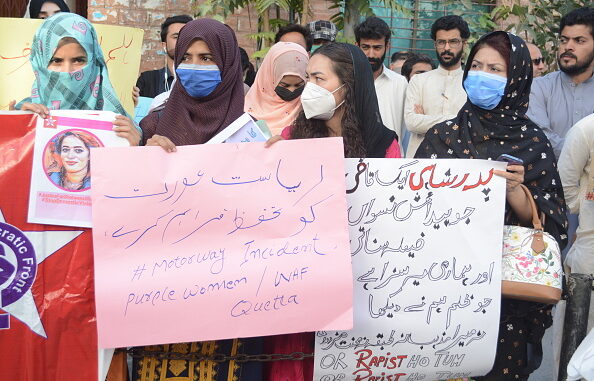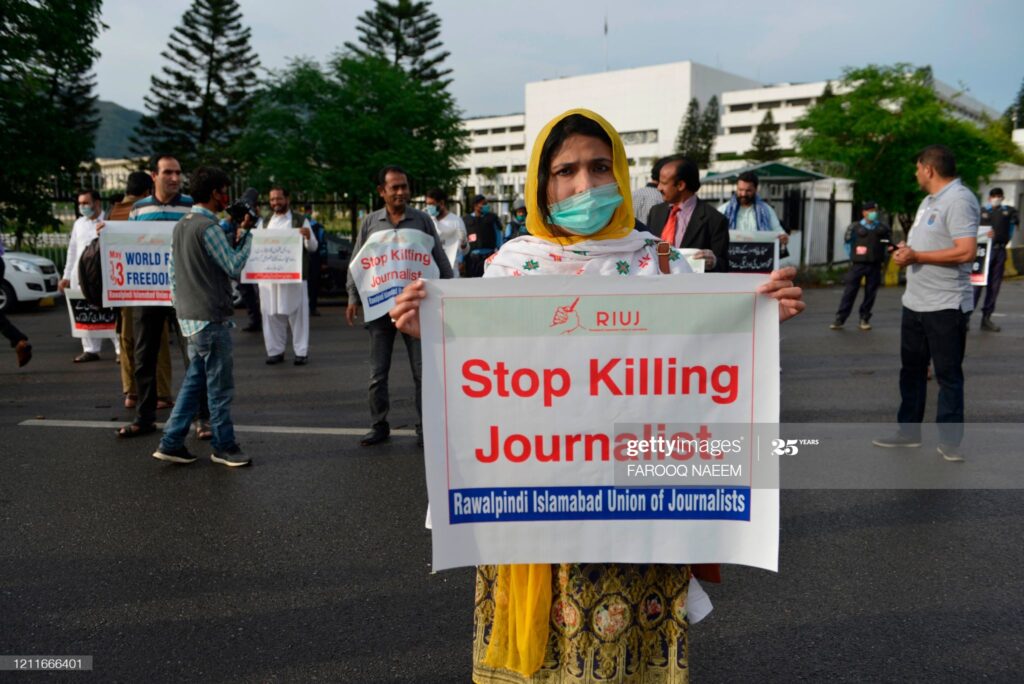
Dozens of women journalists in Pakistan have complained against a coordinated and vicious social media campaigns intended to intimidate, discredit and harass them and others in their profession.
“I had to leave my job and career because of the bad name we bring to our families, the comments people leave on our pictures and the replies on our tweets,” said Ayesha Khalid, a former news presenter at Geo TV, one of Pakistan’s private news channels. “Not everyone has a strong support system. Many a time, my husband’s name would also be dragged into a Twitter argument as random trolls would tag him to humiliate me.”
Khalid joined the channel in 2010, but quit journalism in 2017 because of the regular trolling she experienced.
She was among the dozens of women journalists who presented testimony before a parliamentary committee on human rights about how they faced gender-specific bias and threats.
Some accused the ruling party, Pakistan Tehreek-e-Insaf (PTI), of trolling, while others blamed right-wing elements for the “organized” attacks. They described how they were being called prostitutes and whores and were threatened with rape and death.
Khalid said the trolling started in 2014, when then-PTI party leader Imran Khan staged a sit-in at parliament in Islamabad to protest Prime Minister Nawaz Sharif’s government. She was an active user of Twitter but deactivated it because of the persistent trolling and intimidation.
“No party, other than the PTI, has such a persistent behavior of online trolling where you get abused over every critical program, article or tweet,” Khalid said. “I had never reported anything against the PTI, appeared on any program to confront their narrative, nor did I ever write an article criticizing their policies. Still, I would get tons of abuse only for my tweets.”
She said that once she was trolled incessantly, and when she traced the information on the bio, it was a PTI troll.
“Imagine, he (the troll) was a teacher in Islamabad who challenged me openly … . I filed an online harassment report, but nothing happened.”
According to Reporters without Borders (RSF), an organization that works to protect journalists and safeguard the right to freedom of information, Pakistan ranks 145 of the 180 on the 2020 World Press Freedom Index.
In response to a joint statement by a group of Pakistani women journalists denouncing the cyber-harassment campaign against them by government officials and supporters, Reporters Without Borders called on Pakistani authorities to ensure that online threats and hate messages are stopped.
“We consider the highest levels of the Pakistani government as either responsible or complicit in these recent cyber-harassment campaigns against certain women journalists who don’t toe the official line,” said Daniel Bastard, the head of RSF’s Asia-Pacific desk. “These tactics, which clearly aim to intimidate all government critics, is a flagrant violation of Article 19A of Pakistan’s Constitution. We call on Prime Minister Imran Khan to ensure this unacceptable use of hate speech is brought to a stop.”
Young journalists reporting from the field also say they have received threats and trolls to prevent them from working.
In one incident, Ramisha Ali said she was harassed while covering the start of the Azaadi (Freedom) March of right-wing religio-political party Jamiat Ulama-e-Islam Pakistan.
“As I started filming, an organizer came up to me with a stick in his hand and questioned ‘are you here to spread vulgarity and test our faith?’” said Ali, who works for Independent Urdu news website.
“They started shouting at me and a few others also joined. Other male journalists told me to back down and I literally had to take refuge in one of the DSNGs (Digital Satellite News Gathering vans).”
Ali said the harassment did not end there as a man was stationed outside the van to ensure she did not come out of it to continue reporting.
“I was covered from head to toe as I know how to dress up for such rallies [but] I felt threatened and weak as a woman journalist,” she said.
Nasir Zaidi, secretary-general of the Pakistan Federal Union of Journalists, said it was brave and a step in the right direction that the women journalists had approached the parliamentarian body on human rights as a unified force.
“The unified stance has sent a strong message to the government and all political and other bodies that the women journalists in Pakistan are a force to reckon with,” Nasir said.
He said that successive governments have failed miserably to provide a safe and secure environment for journalists in the country.
“The journalists in Pakistan are facing a crisis of safety and survival,” he said. “Irrespective of the gender, the space for journalists is diminishing every day. In the name of national security, we are being stopped from doing our job. Certain regions in our own country have become no-go areas for us.”
Khalid said she struggled and worked hard to make her name, but no one is willing to respect her for her efforts.
“You can respond to the trolls or maybe ignore them. The real impact is on your personal lives. My mother is a teacher at a government school. She was put in a tough spot by her colleagues on numerous occasions because of their questions about me,” Khalid said.
Saba Aitezaz, another journalist, fled the country in 2017 after receiving threats and facing harassment from “military intelligence and intelligence officials” following her assignments in Balochistan while she worked for BBC Urdu.
“I was inundated with graphic rape threats, violence and accusations of treason. I had seen what happened to journalists who were accused of ‘anti-national interests,’” she said. “One of the tweets actually had my personal details on it, inciting violence against me.”
Today, Aitezaz works as an on-air host with the Toronto Star, Canada’s largest online news site.

Like other journalists, Aitezaz said she could not count on the state for her security. She recalled going to the police after getting a call threatening an acid attack, and the police, instead of helping, laughed at her and said, “Oh, the poor boy must have a crush on you.”
Aitezaz said she was even let down by other journalists, especially her male peers.
“I wasn’t supported much by my male peers. A lot of them privately expressed opinions that I actually ‘provoked’ this kind of harassment because I reacted and responded to them publicly,” she said.
“It dawned upon me that as a female, unprotected journalist with no family or connections, I was more vulnerable than most. Also, I realized the state or my peers weren’t going to be responsible for my safety. So, I decided to leave the country.”
(Edited by Siddharthya Roy and Judy Isacoff.)
The post Online Trolls, Threats in Pakistan Force Women Journalists to Quit, Flee Country appeared first on Zenger News.
